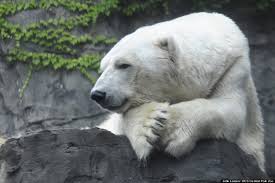
Gus the Polar Bear's death has been widely eulogized in the news and social media over the past few days, but nowhere have I seen outrage expressed about the plight of Gus and other large mammals who "live" at zoos. Nearly 20 million people came to observe the beloved Gus over the 25 years he spent at the Central Park Zoo in New York City. The word "observed" is intentional: the zoo's website characterized him as an "attraction." But Gus was a trapped animal, a big white teddy bear safely watched from a distance for the amusement of kids and grown-ups alike while he suffered in silence.
Poor Gus was often described as "neurotic, "kooky," a Woody Allen of a bear, befitting his New York address. But these gentle descriptors were a way to avoid saying what was really going on, and what animal behaviorists called in to observe Gus thought - that the quirky "bipolar bear" actually suffered from long-term depression, evident in the way Gus endlessly swam back and forth, back and forth, like a 700-pound metronome. Born in the arctic wilderness of Toledo, Ohio, he never visited his natural habitat and was forced to spend his life under house arrest, unable to roam the hundreds of miles that are the normal home range of a polar bear. His North Sea was the size of an inflatable backyard pool; the New York summer was his cool arctic breeze. He lived alone for the last two years of his life, after his great love Ida died, no new bear brought in to keep him company.
Did it make sense at one point to bring big animals into captivity so that humans could experience them in a way not possible before moving images? Perhaps. Has it made humans more sensitive to the plight of animals and endangered species? Maybe yes, maybe no. But now we have TV series, entire networks and feature films devoted to species great and small, all of whom need to remain, and be protected in, their natural habitats. And if we need to study them more closely to obtain research critical to their survival, if animals in zoos need to "take one for the team," please don't issue them a life sentence in the equivalent of a New York studio apartment.
If you're feeling sad for you and your kids and the many delightful hours you spent watching Gus in his plate glass cell, take a moment to mourn the life he lead for your enjoyment. And then celebrate that he is finally free.
